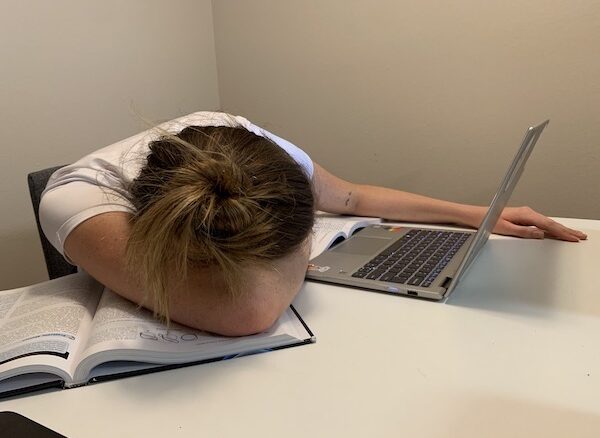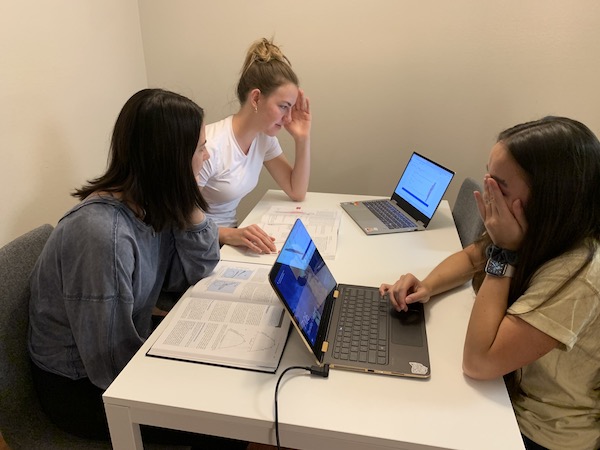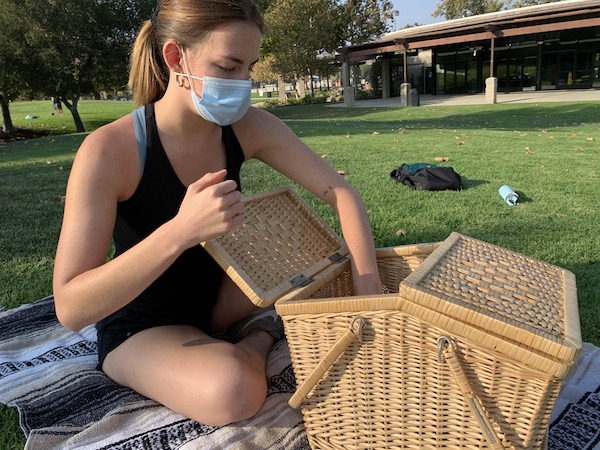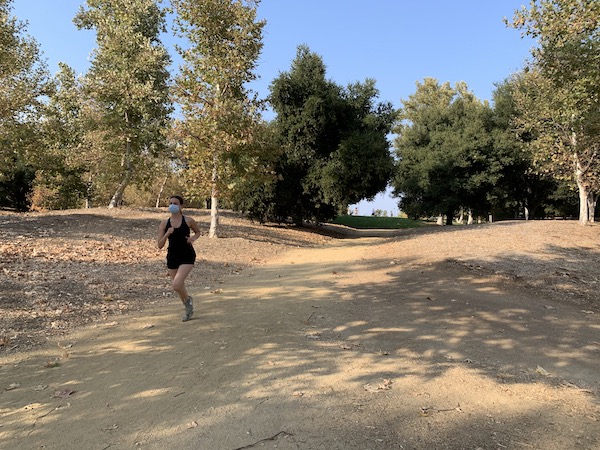
With a second semester of online classes in full swing, a devastating global pandemic, wildfires ravaging the West Coast, and a particularly polarized election, it’s no surprise that the rates of depression and anxiety disorders throughout the United States have been on the rise since March.
The U.S. Census Bureau’s 2020 Household Survey indicated that nearly a third of Americans are now showing signs of clinical depression and anxiety since quarantine began. College students were already demonstrating a rise in anxiety and depression rates, according to a 2019 survey by the American College Health Association.
“Before the pandemic dominated my daily routine, I was still adjusting to my post-abroad semester, but things were looking up as I found new ways to get involved on campus,” Maya Hammer, junior sports medicine major, said. “Now, during the pandemic, it feels like my anxiety has taken three steps backward.”
The effects of COVID-19 left many students displaced, isolated, and emotionally fatigued, and as a result younger generations have now reported the highest rates of anxiety and depression in the U.S. despite being the least affected by the coronavirus.
The Pepperdine community and COVID-19
Pepperdine students have been feeling the effects of this prolonged pandemic compounded by the unyielding responsibilities of school and/or work.
A Pepp Post poll of 58 Pepperdine undergraduate students found that roughly 46% of respondents strongly agreed that they have experienced symptoms of depression since the beginning of the semester.
Similarly, about 36% of the respondents strongly agreed that circumstances outside of their control have made it more difficult for them to perform well academically this semester.
“Everyday feels the same, honestly,” said Angelo Tardivo-Meza, sophomore integrated marketing communication major. “I’m constantly glued to my computer and once I’m done with a class, I feel no sense of accomplishment because there is always something else to be working on. This never ending cycle has made me feel more stressed and anxious most days.”
The monotony of life during a remote semester has changed the way some students approach school.
“I don’t retain information as well as I used to [in person],” Hammer said. “I feel like a completely different student which has affected my motivation because things just feel more difficult now.”
Sophia Fang, a counselor at the Pepperdine Counseling Center, said in a presentation to the Student Wellness Advisory Board (S.W.A.B.) that she has noticed Pepperdine students as a whole are independent high-achievers, which can keep them from getting help for their mental health.
“We are definitely seeing more mental health concerns; we feel less connected to people and to the world since we have less interaction and validation,” Fang said. “[Students] don’t want to feel like a burden to others so they don’t reach out.”
Independence is an extremely admirable trait amongst the student body. However, in such turbulent times, community and connectedness are more important than ever, Fang said, and the Counseling Center and Student Wellness Advisory Board recommended prioritizing both.
“You are not a burden,” Fang said. “Educate yourself and know the resources.”
COVID-19 and its effect on college students
There are various factors related to COVID-19 that contribute to the increase in depression rates, Dr. Maurizio Fava, psychiatrist-in-chief within the department of Psychiatry at Massachusetts General Hospital, said in a hospital news release. This includes trauma from widespread disease, grief over loss of loved ones, fear of getting sick, loss of social interaction/community and financial distress including unemployment and housing insecurity.
“We’re living in a world where the goalposts are moved everyday,” Ramani Durvasula, a clinical psychologist and professor of psychology at California State University Los Angeles said in an interview with CBS News. “That kind of uncertainty is bringing out anxiety for everyone. If it’s not directly about the pandemic, it’s about money, jobs, education, and overall everyone’s well being.”
The reported rates of depression and anxiety were far higher among young adults, women and families with lower income. Since younger generations have been least affected by COVID-19, many conclude that their upbringing in the digital age has left them more susceptible to mental health challenges.
Public Relations Professor Michelle Truleson said she has concerns about a generation that has come of age with social media, creating an increased pressure on appearances and “likes.” She is worried about how they’re handling the new set of obstacles with online classes.
“This group is now isolated, spending their days looking at themselves and their peers on a screen and I don’t know how healthy that is,” Truelson said. “This could further fuel comparison and insecurities, especially in a culture that places so much emphasis on appearance and possessions.”
College students are already considered a population particularly vulnerable to mental health conditions, according to the Journal of Medical Internet Research.
Students are screening positive for depression and anxiety at higher rates than in previous years, according to a study by the Student Experience in the Research University. This comes at no surprise to professionals due to the recent conditions yielded by COVID-19.
Many students had work or internship opportunities this past summer fall through or be postponed. And they will soon enter the job market with gaps in their resume, unsure if they’ll be able to find employment after four years of hard work.
Additionally, many students are displaced this semester, away from either family or friends. Housebound and taking classes online, they’re also spending increased time on devices and social media. Devices used to be a sense of comfort for the younger generation, but now feeds are filled with anxiety-inducing news and laptops are primarily used for homework.

Mental health and learning
With an influx in symptoms of depression and anxiety, students are struggling to pay attention to classes, especially in a remote environment, and are apprehensive to contribute.
“I see first-hand that it’s a lot harder for students to focus,” Truelson said. “I do breakout room discussions and flip the classroom when I can. I’m trying to find ways to keep students engaged while being aware that on some level, it’s impossible to achieve what we do in person.”
Truelson, along with many other professors, have done their best both before the semester started and during to ensure their students are receiving a quality education.
“I spent some time prior to the semester reviewing my syllabi to see where I could cut down and make allowances this semester,” Truelson said. “It’s a fine line of finding a balance of rigor and expectations, as well as accommodating and understanding the needs of my students.”
As a mother and professor, Truelson acknowledges the difficulties being faced by students, and everyone, this semester.
“We’re all in a different environment and the truth is we need some more latitude because times are difficult,” Truelson said.

What students can do
In interviews with the Student Wellness Advisory Board (S.W.A.B.), Emma Mattingly, co-president, and Simone Decker, representative of the healthy minds committee, provided helpful insight and tips on how students and faculty can maintain good mental health.
“Right now we are in the middle of midterms; a downward slope,” Mattingly, a senior psychology major, said. “So there’s a tendency for students to fall into depressive moods during this time.”
S.W.A.B. focuses on providing health and wellness events and resources to Pepperdine students.
“We’re partnered with the office of Title IX, the Counseling Center, and the Student Health Center to cover the three sub-groups we have: healthy minds, healthy bodies and healthy communities,” Decker, a junior advertising major, said.
The Student Wellness Advisory board believes that overall health encompasses all three categories, and if one is lacking it can take a toll in other areas of someone’s life.
“It’s really important to remember to take some time for yourself right now,” Decker said. “People have been spending much more time on their devices because they feel it’s their only connection to the world during isolation, but we need to remember to take time away from the internet to reset. Go outside! Do some journaling! Cook a new recipe!”
This is easier said than done, of course. It’s easy to get stuck in the rut of day-to-day stressors, but Decker recommends pushing oneself out of one’s normal routine to avoid falling into anxious or depressive states.
“Be diligent and intentional in communicating with people, but remember to set aside time for yourself,” Mattingly said.
Freshman psychology major Hailey Kawamura said she was especially motivated to connect with her peers before starting her first semester of college.
“I started following my classmates on Instagram and reaching out to some of them,” Kawamura said. “which is something I’m not usually comfortable doing, but I knew that I was going to have to get used to being uncomfortable in order to create those relationships.”
Despite less than ideal circumstances, Kawamura was able to get involved on campus through joining a sorority, getting her first job with JumpStart on campus, and reaching out to the University Church of Christ Campus Ministry.
“Being able to connect with those people and gain community in that way was really helpful for me to make up for the loss of being on campus,” Kawamura said.
Both Decker and Mattingly maintain that achieving complete health means having a healthy mind, body and community. Kawamura sets an example of how one can build and maintain a healthy community of people, even from across the country.
It’s important to be self aware and able to recognize the areas of one’slife that need work, Mattingly said. Prioritizing some sort of self-care activity throughout the day helps keep at least one area in check.
“It can be five minutes if that’s all you have, but just do something that makes you happy and takes your mind away from all of this stress and anxiety,” Mattingly said.

“Being out in nature running or exercising in general helps me clear my mind,” Hammer said. “After a day of being cooped up in my apartment tied to my laptop, it’s my mental and physical escape.”
Exercise is just one of many ways to take care of oneself during this time.
“Self care looks different for everyone, so if you’re feeling overwhelmed with school, work, life — anything, think of what brings you tranquility or joy and spend some time doing that,” Decker said.Harvard Medical School professionals recommend to acknowledge and mourn losses, fuel one’s body with healthy foods, exercise regularly, prioritize sleep, connect socially, and find ways to ease stress like cuddling with a pet or listening to music.

It can be as simple as starting small by cleaning one’s room or workspace to give oneself a clearer state of mind, Fang told the students at the S.W.A.B. meeting. However, there are some cases in which a mental health crisis is too overwhelming to complete even miniscule tasks.
“The Pepperdine Counseling Center now offers a 24-hour crisis intervention hotline in which you can connect with a licensed professional and get the help you need,” Fang said.
Students can reach this hotline anytime by calling (310) 506-4210.
In addition to the crisis hotline, the Counseling Center also offers a web resource page, university partnerships with four mental health apps, and free online mental health screenings for students.
Maddie Schoen completed the reporting for this story in Jour 241 in Fall 2021 under the supervision of Dr. Christina Littlefield and Dr. Theresa de los Santos. Dr. Littlefield supervised the web version of the story.




